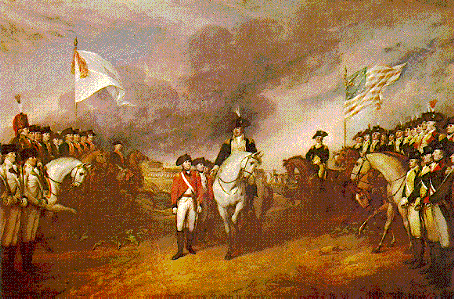
British surrender at Yorktown by John Trumbull
(Yale Art Gallery)

| Event | Date | Location | Significance | |
| Lexington-Concord | April 1775 | Massachusetts | First armed conflict. British destroy supplies at Concord but suffer numerous casualties on way back to Boston. Propaganda victory for U.S. Casualties: U.S.:95. British: 273. | |
| Ft. Ticonderoga | May 1775 | Lake Champlain | Ethan Allen and Benedict Arnold captured fort and 60 cannon later dragged 300 miles and used in defense of Boston | |
| Breed's Hill (Bunker Hill) | June 1775 | Boston | British succeed but suffer huge losses (1000 casualties) 1/6
of all British officers killed in war die here. Americans lose 400 dead
and wounded. Only
battle in long siege of Boston. |
|
| Invasion of Quebec | Winter 1775-76 | Maine/Canada | Gens. Arnold and Montgomery attack Quebec prematurely and fail in invasion attempt of Canada | |
| Dorchester Heights | March 1776 | Boston | British forced to evacuate New England after cannon put in
place. |
|
| Declaration of Independence | July 1776 | Philadelphia | Following the success of Thomas Paine's Common Sense, many colonists urged
their delegates to the 2nd Continental Congress to call for
independence. The Declaration starts with an assumption (all people
have equal, inalienable rights), states two premises (people establish
governments to protect rights & George III has failed to defend
American rights), and concludes with an assertion: Americans can
rightfully overthrow British rule. |
|
| New York (Brooklyn Heights--Long Island, White Plains ) |
August 1776 | New York | U.S. forces forced to retreat to Manhattan, then New Jersey.
British General Howe offered generous terms of surrender to the
Americans, but they demanded independence and talks broke down. |
|
| Trenton | December 1776 | New Jersey | Hessian army crushed in Washington's raid across the Delaware River. Casualties: U.S. :4, British: 900 | |
| Princeton | January 1777 | New Jersey | U.S. recovers New Jersey from British in 10 days. British retreat to New New York, where they remain for the war. | |
| Brandywine Creek Germantown |
September 1777 October 1777 |
Pennsylvania | British seize Philadelphia after these victories. |
|
| Saratoga | October 17, 1777 | Upstate New York | Turning point of war. Convinced French of U.S. strength. Burgoyne surrenders 5800 men. | |
| Monmouth | June 1778 | New Jersey | U.S. army almost captured British but cowardice allowed British forces to escape | |
| Savannah | December 1778 | Georgia | Beginning of British push in the South. British are at first
welcomed in Savannah and colonial government is restored. |
|
| Kaskaskia and Vincennes | February 1779 | Western territories | Clark captures British forts which proved important in negotiations with British after the war | |
| Charleston | December 1779 | South Carolina | British gain control of South with victory here. 5000
Americans surrender and the single largest loss of troops until the
Philippines in 1942. |
|
| King's Mountain | October 1780 | South Carolina | Bloody victory for U.S. |
|
| Cowpens |
January 1781 |
South Carolina |
Gen. Greene divided his forces
and scored a victory over Cornwallis, who had a larger army. |
|
| Guilford Court House |
March 1781 |
North Carolina |
In fierce fighting, Americans
frustrate British, who control Southern cities, but not the rural
areas. While winning the field, Cornwallis finally gives up attempt to defeat Greene's army and plans to link up with British
supplies and reinforcements in Virginia. |
|
| Yorktown | October 19, 1781 | Virginia | With 7800 French soldiers and the French fleet in the harbor,
Washington accepts Cornwallis' surrender as major fighting ends. |
Please cite this source when appropriate:
Feldmeth, Greg D. "Revolutionary War Events," U.S. History Resources <http://www.polytechnic.org/faculty/gfeldmeth/chart.rev.html> (Revised 25 June 2004).